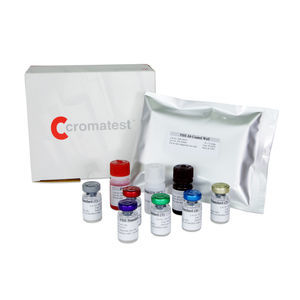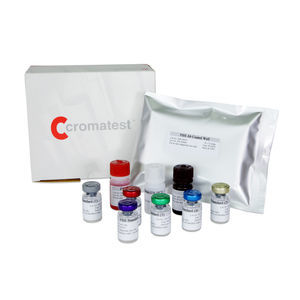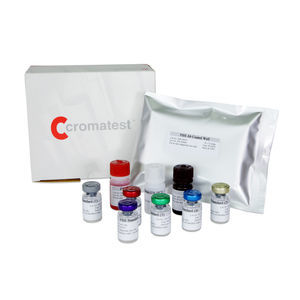
- Laboratory
- Laboratory medicine
- Solution reagent
- LINEAR CHEMICALS
Solution reagent kit 6407430 ELISA testPSA
Add to favorites
Compare this product
Characteristics
- Type
- solution
- Applications
- ELISA test
- Tested parameter
- PSA
- Storage temperature
Min.: 2 °C
(36 °F)Max.: 8 °C
(46 °F)
Description
Human prostate-specific antigen (PSA) is a serine protease, a single chain glycoprotein with a molecular weight of approximately 34,000 daltons containing 7% carbohydrate by weight. PSA is immunologically specific for prostatic tissue, it is present in normal, benign hyperplastic, and malignant prostatic tissue, in metastatic prostatic carcinoma, and also in prostatic fluid and seminal plasma. PSA is not present in any other normal tissue obtained from men, nor is it produced by cancers of the breast, lung, colon, rectum, stomach, pancreas or thyroid. Besides, it is functionally and immunologically different from prostatic acid phosphatase (PAP). Elevated serum PSA concentrations have been reported in patients with prostate cancer, benign prostatic hypertrophy, or inflammatory conditions of other adjacent genitourinary tissues, but not in apparently healthy men, men with non-prostatic carcinoma, apparently healthy women, or women with cancer.
PRINCIPLE OF THE TEST
The PSA ELISA test is based on the principle of a solid phase enzyme-linked immunosorbent assay. The assay system utilizes a rabbit anti-PSA antibody directed against intact PSA for solid phase immobilization (on the microtiter wells). A monoclonal anti-PSA antibody conjugated to horseradish peroxidase (HRP) is in the antibody-enzyme conjugate solution. The test sample is allowed to react first with the immobilized rabbit antibody at room temperature for 60 minutes. The wells are washed to remove any unbound antigen.
Catalogs
No catalogs are available for this product.
See all of LINEAR CHEMICALS‘s catalogsRelated Searches
- Assay kit
- LiNEAR solution reagent
- Blood assay kit
- LiNEAR molecular biology reagent
- Immunoassay assay kit
- Plasma assay kit
- Infectious disease detection kit
- LiNEAR rapid blood test
- LiNEAR protein reagent
- LiNEAR diagnostic reagent
- Rapid lateral flow test
- LiNEAR laboratory reagent
- Immunoassay rapid diagnostic test
- LiNEAR cassette rapid test
- LiNEAR rapid virus test
- LiNEAR rapid serum test
- LiNEAR rapid plasma test
- Histology reagent kit
- LiNEAR biochemistry reagent
- LiNEAR medium reagent
*Prices are pre-tax. They exclude delivery charges and customs duties and do not include additional charges for installation or activation options. Prices are indicative only and may vary by country, with changes to the cost of raw materials and exchange rates.














